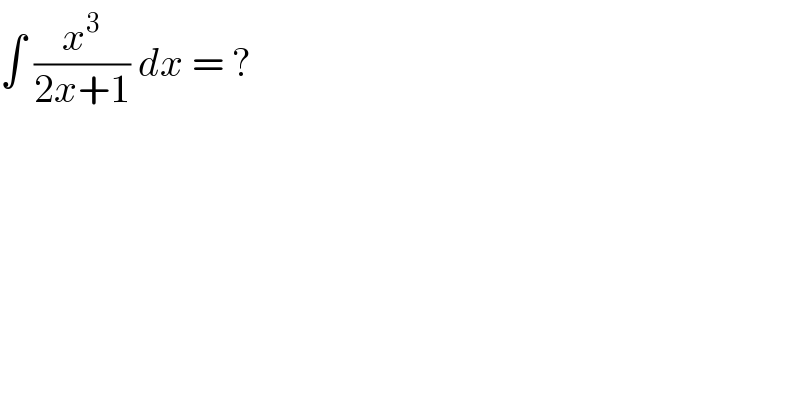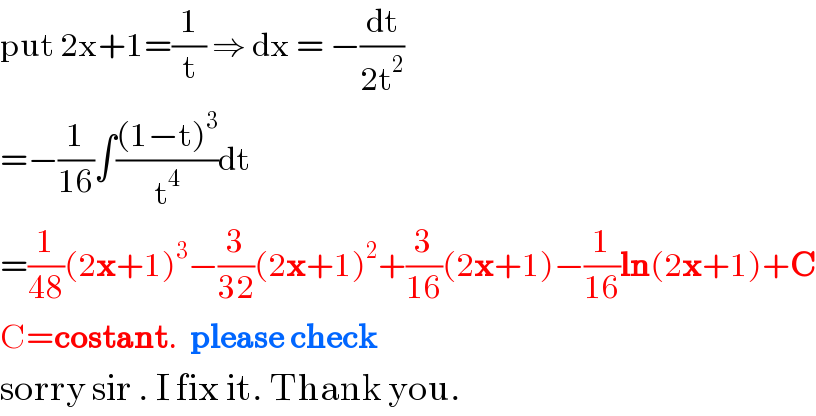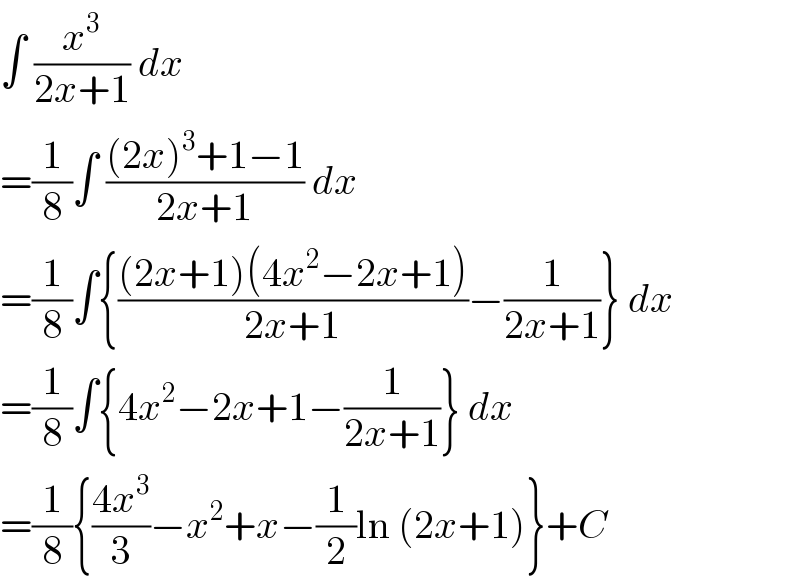
Question Number 91542 by jagoll last updated on 01/May/20

$$\int\:\frac{{x}^{\mathrm{3}} }{\mathrm{2}{x}+\mathrm{1}}\:{dx}\:=\:? \\ $$
Commented by Prithwish Sen 1 last updated on 01/May/20

$$\mathrm{put}\:\mathrm{2x}+\mathrm{1}=\frac{\mathrm{1}}{\mathrm{t}}\:\Rightarrow\:\mathrm{dx}\:=\:−\frac{\mathrm{dt}}{\mathrm{2t}^{\mathrm{2}} } \\ $$$$=−\frac{\mathrm{1}}{\mathrm{16}}\int\frac{\left(\mathrm{1}−\mathrm{t}\right)^{\mathrm{3}} }{\mathrm{t}^{\mathrm{4}} }\mathrm{dt}\: \\ $$$$=\frac{\mathrm{1}}{\mathrm{48}}\left(\mathrm{2}\boldsymbol{\mathrm{x}}+\mathrm{1}\right)^{\mathrm{3}} −\frac{\mathrm{3}}{\mathrm{32}}\left(\mathrm{2}\boldsymbol{\mathrm{x}}+\mathrm{1}\right)^{\mathrm{2}} +\frac{\mathrm{3}}{\mathrm{16}}\left(\mathrm{2}\boldsymbol{\mathrm{x}}+\mathrm{1}\right)−\frac{\mathrm{1}}{\mathrm{16}}\boldsymbol{\mathrm{ln}}\left(\mathrm{2}\boldsymbol{\mathrm{x}}+\mathrm{1}\right)+\boldsymbol{\mathrm{C}} \\ $$$$\mathrm{C}=\boldsymbol{\mathrm{costant}}.\:\:\boldsymbol{\mathrm{please}}\:\boldsymbol{\mathrm{check}} \\ $$$$\mathrm{sorry}\:\mathrm{sir}\:.\:\mathrm{I}\:\mathrm{fix}\:\mathrm{it}.\:\mathrm{Thank}\:\mathrm{you}. \\ $$
Commented by jagoll last updated on 01/May/20

$${wrong}\:{in}\:\mathrm{ln}\left(\mathrm{2x}+\mathrm{1}\right)\: \\ $$$$\mathrm{it}\:\mathrm{should}\:\mathrm{be}\:−\frac{\mathrm{1}}{\mathrm{16}}\mathrm{ln}\left(\mathrm{2x}+\mathrm{1}\right) \\ $$
Commented by john santu last updated on 01/May/20

$${in}\:{other}\:{method}\:{by}\:{long}\:{division} \\ $$$${then}\:{integrate}\:{the}\:{result} \\ $$
Answered by mr W last updated on 01/May/20

$$\int\:\frac{{x}^{\mathrm{3}} }{\mathrm{2}{x}+\mathrm{1}}\:{dx} \\ $$$$=\frac{\mathrm{1}}{\mathrm{8}}\int\:\frac{\left(\mathrm{2}{x}\right)^{\mathrm{3}} +\mathrm{1}−\mathrm{1}}{\mathrm{2}{x}+\mathrm{1}}\:{dx} \\ $$$$=\frac{\mathrm{1}}{\mathrm{8}}\int\left\{\frac{\left(\mathrm{2}{x}+\mathrm{1}\right)\left(\mathrm{4}{x}^{\mathrm{2}} −\mathrm{2}{x}+\mathrm{1}\right)}{\mathrm{2}{x}+\mathrm{1}}−\frac{\mathrm{1}}{\mathrm{2}{x}+\mathrm{1}}\right\}\:{dx} \\ $$$$=\frac{\mathrm{1}}{\mathrm{8}}\int\left\{\mathrm{4}{x}^{\mathrm{2}} −\mathrm{2}{x}+\mathrm{1}−\frac{\mathrm{1}}{\mathrm{2}{x}+\mathrm{1}}\right\}\:{dx} \\ $$$$=\frac{\mathrm{1}}{\mathrm{8}}\left\{\frac{\mathrm{4}{x}^{\mathrm{3}} }{\mathrm{3}}−{x}^{\mathrm{2}} +{x}−\frac{\mathrm{1}}{\mathrm{2}}\mathrm{ln}\:\left(\mathrm{2}{x}+\mathrm{1}\right)\right\}+{C} \\ $$
Commented by Prithwish Sen 1 last updated on 01/May/20

$$\mathrm{Excellent} \\ $$
Commented by jagoll last updated on 01/May/20

$${yes}.\:{very}\:{creative}\:{sir} \\ $$
Answered by jagoll last updated on 01/May/20

